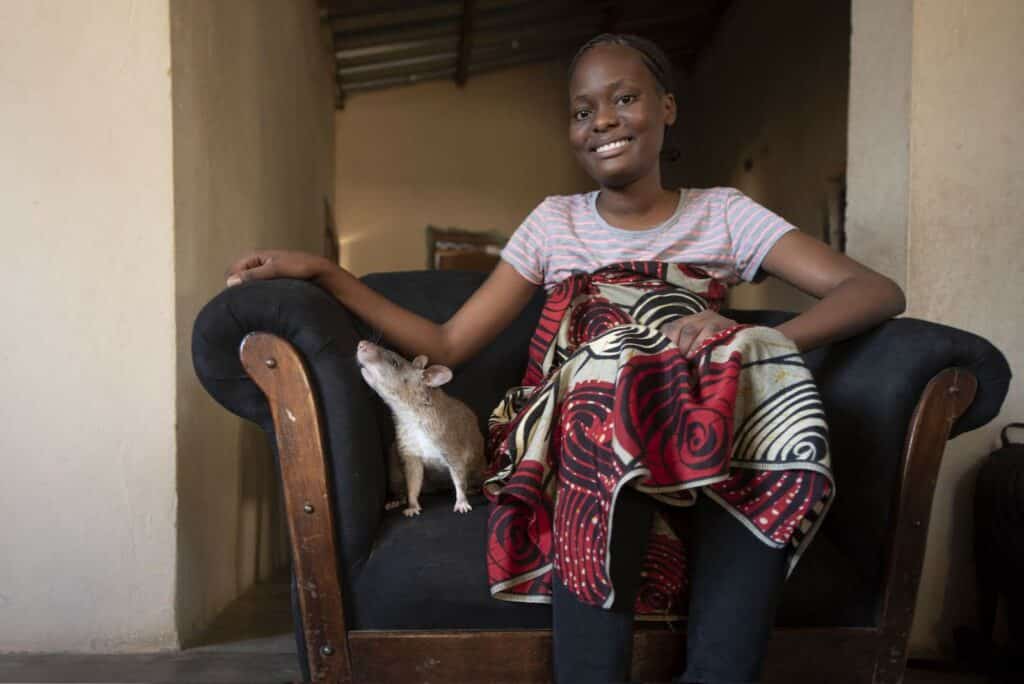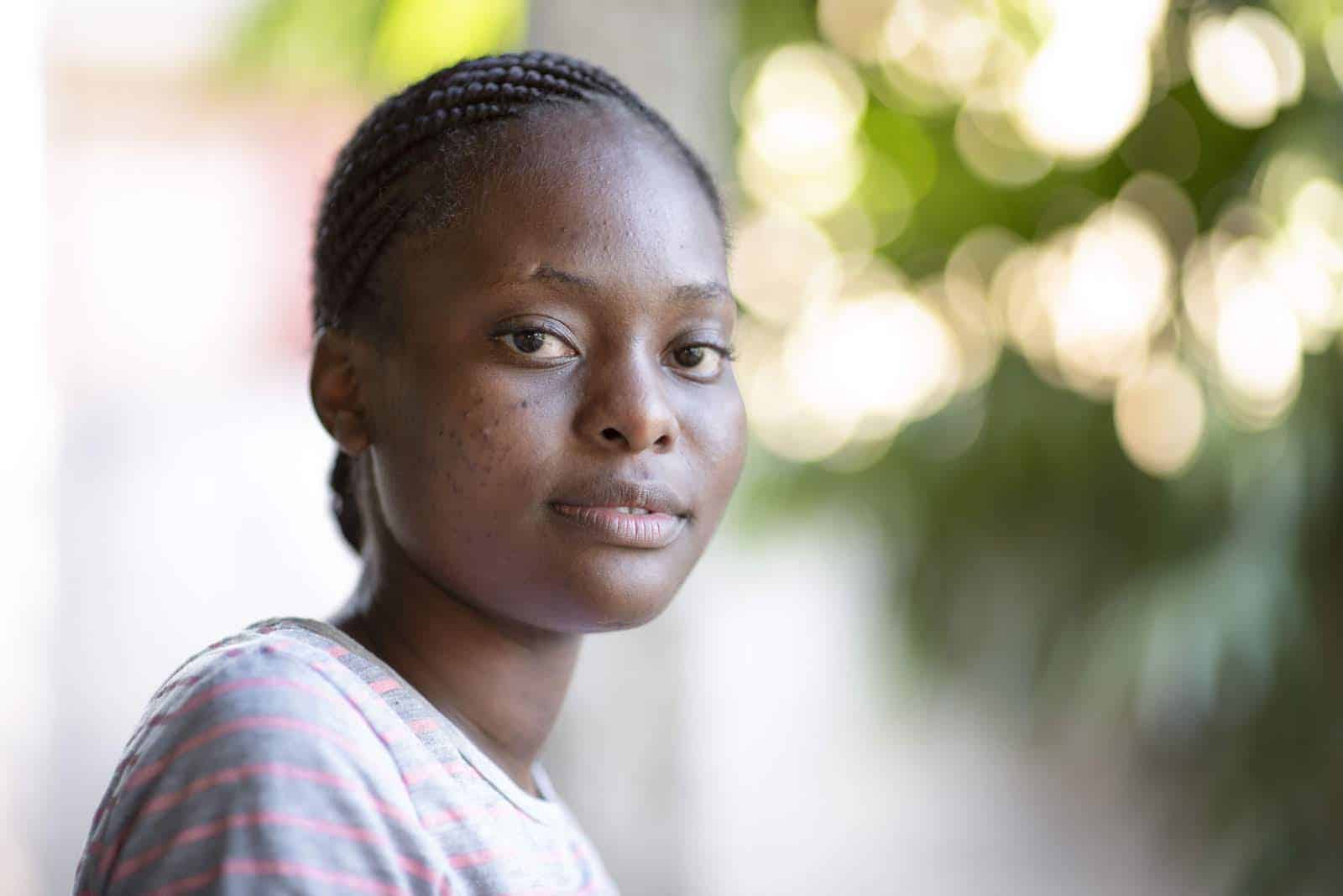The HeroRATs helped find Ana’s multi-drug resistant tuberculosis.
“My name is Ana Mabote. I am 26 years old and currently living with my mother and son, while my husband is building our family home in the Matola area. I was diagnosed with multi drug-resistant tuberculosis (MDR-TB) which is caused by TB bacteria that is resistant to the most potent TB medication. During my treatment, I have been staying with my mother as she looks after both me and my son. I am truly grateful for APOPO’s work in Mozambique. At this interview, I am sitting with Astrid, my Hero.

I did not know anyone with TB before my hospitalization. When I was diagnosed with TB, I cried for a whole week, felt stressed, and had high anxiety. I was in denial that this could happen to me and my family. I always thought that TB and other diseases exist in others but not in our family. My husband and I have good hygiene, and I do not drink, smoke, or have lots of outside contacts. I was in shock to know that my diagnosis was even more dangerous and needed two years of treatment. The intensive phase is 6 months, where I must take 14 pills, plus 1 injection per day! But with commitment and family support, I know that I can overcome TB. TB is considered a dangerous disease in the community because it can be transmitted easily. People become very ill, and there is a negative stigma in the community for those that have tested positive for TB.
Airborne Disease
I do not know or even recall how I could have contracted TB. I believe it might have been in the semi-public transport “chapa cem” because it is a closed environment where people are packed together. Often it is cold and people want to close the windows, but it is full of people. In such a tight environment it is easy to transmit a bacterial disease such as TB.
My husband and I learned about the disease and how it transmits, during my in-patient stay. We were taught cough etiquette, which is coughing into the internal part of the elbow, because it can protect others from the spread of TB. To wash the linens every day and expose the blankets and pillows to the sun because it puts the bacillus asleep or even kills them. Also, to open windows in close quarters. When I returned to work, I told everybody that we needed to keep the windows open. So now, if someone feels cold they put a pull-over on.
Treatment
After I take my medication in the morning, most days I feel normal and even forget I am sick. In 2017, before this current treatment with APOPO, I suffered from a previous bout of TB in Matola. I was treated at the local clinic and I remember finishing the treatment, but did not complete a control test at the end. Now, I know that more analysis and tests must be done when undergoing TB treatment to ensure it’s effectiveness. The clinic I go to now is a partner clinic of APOPO. They are careful, the treatment is monitored and more intensive; I can see the evolution and feel the difference.
My MDR-TB started like a flu early in the year. The doctors gave me treatment for my symptoms, but it didn’t help. I went to the Provincial Hospital and they repeated the anti-flu treatment, but I started having a respiratory crisis and very high fever. The fever was more intense at night, and I struggled to breathe. I spent a night in the intensive care unit where doctors diagnosed me with pneumonia.
I completed treatment for the pneumonia but my breathing problems continued. When I was released from Provincial Hospital, I still had breathing difficulties and high fever, so I decided to go to the central hospital in Maputo, the big city. They hospitalized me in the pneumology ward and then they transferred me to Machava, a hospital for respiratory diseases and TB. Actually, I did not have typical signs of TB; the high fever was the main concern. I did not cough so much, and I had a nearly normal appetite. I was eating a bit less, but I still felt hungry. The TB test was requested during my stay in Maputo Central Hospital, but I did not get the results since I was transferred to Machava.
At Machava, I was afraid since it is notorious for people dying there due to being too sick, too late, or too serious for recovery. In addition, people believed the hospital care was not good there. But it was not true at all, my care was good, and my family came regularly. At times, the nurses had to organize family and friends rotation. It was so important to have the family and friends network to help me cope with the disease and stay in treatment but we had to keep them safe too.
Stigma
At first, I did not disclose to extended family and friends that I was at Machava seeking treatment for TB. But my relatives and friends were persistent, and so finally, I told many of them. I was surprised to find out they wanted to still visit me. I was in the hospital for over 49 days. TB has strengthened many of my friendships even now they continue to visit me at my Mom’s place.
In my experience, when wearing a mask, people look at you with distrust, fear, or even curiosity. If people do have the courage to ask, I have no problem explaining my illness. Some TB patients prefer to stay in the Machava Hospital during the whole treatment course because of the negative stigma associated with TB. In addition, transportation and even being around one’s own family could become uncomfortable.
Diagnosis
The HeroRATs diagnosed my condition. I knew about the HeroRATS, since my sister-in-law is a nurse that visits the APOPO lab. In addition, my brother-in-law works at APOPO too his name is Atilano, he is a rat handler. It is hard to believe at first, but I had seen videos, and heard about the training the rats receive and it was a relief to finally know the root cause of my illness. At APOPO, the rats quickly find TB, and then human lab technician’s confirm it in their own lab using WHO-endorsed confirmation tests before alerting the clinic. For my sample, they did an extra molecular test with the GeneXpert System which detected not only the Mycobacterium tuberculosis but also that there was a resistance pattern.
This HeroRAT, Astrid, which is walking on the sofa next to me is clean and quiet. I had always believed rats as rodents who damage crops and are destructive in homes. I have even heard stories of people’s toes being “chewed” during their sleep. But I know at APOPO, these African giant pouched rats are life-savers. APOPO is doing amazing work! I hope that the organization will continue to grow and that APOPO can expand their services as the population continues to grow in Mozambique.”


